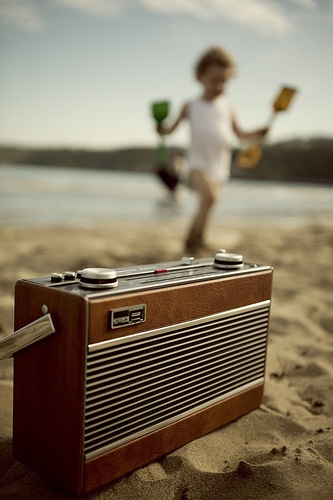We grew up listening to the radio

 In the 1950s we all listened to the radio. Mum was addicted to the long running serial “Blue Hills” on the ABC, to “When a Girl Marries” and to “Dr Paul”.
In the 1950s we all listened to the radio. Mum was addicted to the long running serial “Blue Hills” on the ABC, to “When a Girl Marries” and to “Dr Paul”.
We kids would listen to serials when we came home from school. Favourites included Tarzan, Biggles, Hop Harrigan, Smoky Dawson, Hopalong Cassidy, Robin Hood and Davy Crockett. Younger children listened to the Childrens Hour and became members of the Argonauts Club so that they would get Birthday messages on air. In the evening Dad and Dave was a “must”. Then the family would listen to the Bunkhouse Show, Life With Dexter, The Goon Show, The Village Glee Club, the Minstrel Show, the BBC’s My Music and My Word, the Quiz Kids and variety and game shows hosted by Bob Dyer and Jack Davey. There were great radio drama plays and serialised novels and mysteries like Randy Stone’s Night Beat and Consider Your Verdict. All gripping stuff and great food for the imagination. Australia’s Amateur Hour was extremely popular and one of my mates, who played trumpet, came third in the final one year. I remember all the kids at school voting on “petition” style forms and posting them in to the radio station.
According to Wikipedia records, Australia’s Amateur Hour was an Australian old time radio program, a talent contest, which was broadcast from 1940 to 1958, which also aired on television from 1957 to 1958. The television version was compered by Terry Dear, and ran from August 1957 to February 1958. It aired on TCN-9 in Sydney and HSV-7 in Melbourne. The radio version outlived the television version by several months.
The program was very popular during the war years of the 40’s. During this time radio became an important form of communication and entertainment as people largely stayed at home and there were blackouts. Over time the show had three comperes: the last of these, George Alexander Dear (known as Terry) described the impact the show had during the war years:
When Sammy Dobbs, the great power-that-was at Lever Bros, started up Amateur Hour, he first got Harry Dearth to do it, and he was very good indeed. Then when he joined up, Dick Fair took over and carried it through the war years. That’s when the show got its tremendous popularity. People couldn’t go out; there were blackouts and no street lights and since everybody stayed at home, the radio was the best means of communication. Amateur Hour wasn’t just made in Sydney. It was broadcast from all over Australia. So if a listener heard Dick saying, ‘Good evening, this is Amateur Hour from Cairns in Queensland’, this was real glamour. It was also comforting: the show was still there and still going on, even when the Japs came into the war and people were afraid Australia might be invaded. Dick left he show in 1950, and that’s when I took over. When I did, we were at show number 423 or something like that, and when I finished ten years later we had done something like 930 shows. I was there the longest of the three of us.
The Amateur Hour audience was invited to ring in and vote on the best act. There was a switch board of 10-15 ‘girls’ supplied by Lever Brothers taking down votes. People could also write in. Sometimes people would phone in 50 or 60 votes from a pub for one act. The phone ‘girls’ judged by the background noise whether to accept the votes. Amateur Hour compere Terry Dear describes the tabulation system:
We had a switchboard of ten to fifteen girls supplied by Lever Brothers, taking down votes, or people could write in. There were many ways they could vote, and we sometimes had colossal totals. Sometimes people would ring with a huge number of votes for one act. We wouldn’t know how many people were putting them in, but if there was a lot of background noise, we could assume that they were in a pub. If they put in, say fifty-seven votes, we accepted them. The Amateur Hour organisation was very good, believe me.
The show kept a register as a theatre agent, and would provide performers from the show. Performers such as Bobby Limb, Donald Smith, Johnny O’Keefe and Rolf Harris appeared on the show, and got work that way.
The National Film and Sound Archives has a great deal of radio programs in its collection but many others have been lost.
What radio programs did you grow up listening to? What were your favourite weekly shows? Share your radio memories in the comments below…








 Proudly Australian owned and operated
Proudly Australian owned and operated